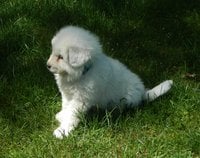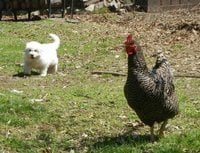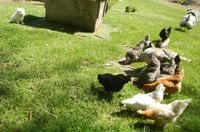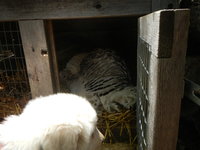- Apr 29, 2012
- 29
- 26
- 99
I have a ~9 week female Great Pyrenes (Kira) that I would like to provide protection for free-range poultry. The present unmitigated danger are *daytime* fox or larger attacks inside the poultry yard. Kira parents and grandparents are working sheep protectors at the breeders farm. Kira's secondary purpose, is to be an outdoor pet - my young kids play with her whenever outside - possibly to excess for Kira. We have only Kira and poultry.
Kira lives in the garage at the back people door, left open during the day, and views the chicken yard and opens into the small yard (dog yard) that borders the chicken yard. At times, a turkey and some chickens enter dog yard where Kira is present and causes NO drama. Kira comes with me on my chicken rounds and is curious about chickens and doesn't chase them. Often when chickens enter the people yard, for food scrap feeding time, the pup sits nearby to watch or sometimes wonders in for treats, the poultry keep 3-4 ft distance from her. She likes to approach the chickens for sniffing, and doesn't chase when they run off.
There are some issues however. She is hated by the present flock guardians (alpha rooster, geese, tom turkeys) as they will and have initiated attacks on her - so she can not be left with the birds. In fact, last evening my rooster got ahold of her a few seconds and the geese like to sneak up on us.
Kira, is also obsessed with turkey feathers (that my kids have collected and brought into the people yard) and likes to chew on them. We also have a nesting turkey that I visit to open/close hutch and Kira gets very excited and tries to get into the hutch - not clear if its to snuggle, eat the eggs, or the hen. I can't find out as the aggressive hen is 10x more aggressive with the pup present. When the hutch was closed, the pup goes to sniff and gets nose pecked. Kira's reaction is curiosity from a greater distance.
In the long run, I intend to keep Kira in the chicken yard by day, and inside the chicken coup at night (due to probable barking in suburban area). By then hopefully the geese will just decide to keep their distance - or get to live outside at night (which actually seems to work without loss).
Its unclear to me what training more of, less of, and what new things I should be doing.
One thought is to crate Kira at night inside the coup - or possibly wait until more she's more confident since it could be traumatic for her.
Kira lives in the garage at the back people door, left open during the day, and views the chicken yard and opens into the small yard (dog yard) that borders the chicken yard. At times, a turkey and some chickens enter dog yard where Kira is present and causes NO drama. Kira comes with me on my chicken rounds and is curious about chickens and doesn't chase them. Often when chickens enter the people yard, for food scrap feeding time, the pup sits nearby to watch or sometimes wonders in for treats, the poultry keep 3-4 ft distance from her. She likes to approach the chickens for sniffing, and doesn't chase when they run off.
There are some issues however. She is hated by the present flock guardians (alpha rooster, geese, tom turkeys) as they will and have initiated attacks on her - so she can not be left with the birds. In fact, last evening my rooster got ahold of her a few seconds and the geese like to sneak up on us.
Kira, is also obsessed with turkey feathers (that my kids have collected and brought into the people yard) and likes to chew on them. We also have a nesting turkey that I visit to open/close hutch and Kira gets very excited and tries to get into the hutch - not clear if its to snuggle, eat the eggs, or the hen. I can't find out as the aggressive hen is 10x more aggressive with the pup present. When the hutch was closed, the pup goes to sniff and gets nose pecked. Kira's reaction is curiosity from a greater distance.
In the long run, I intend to keep Kira in the chicken yard by day, and inside the chicken coup at night (due to probable barking in suburban area). By then hopefully the geese will just decide to keep their distance - or get to live outside at night (which actually seems to work without loss).
Its unclear to me what training more of, less of, and what new things I should be doing.
One thought is to crate Kira at night inside the coup - or possibly wait until more she's more confident since it could be traumatic for her.
Last edited:






